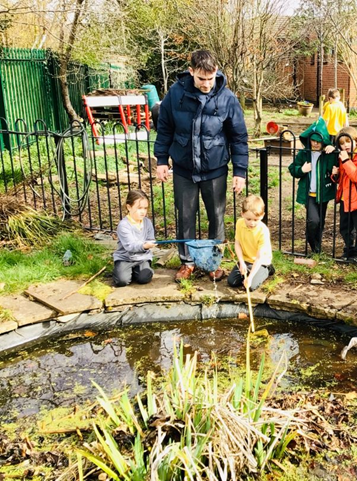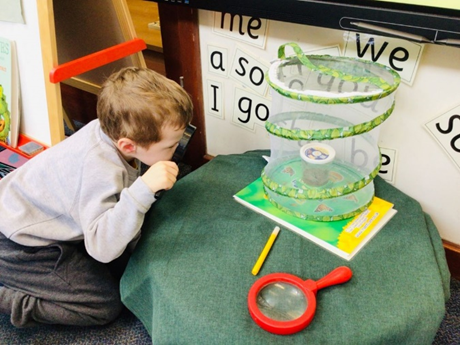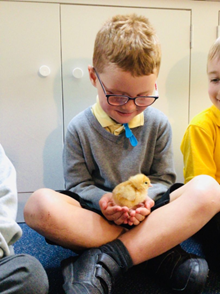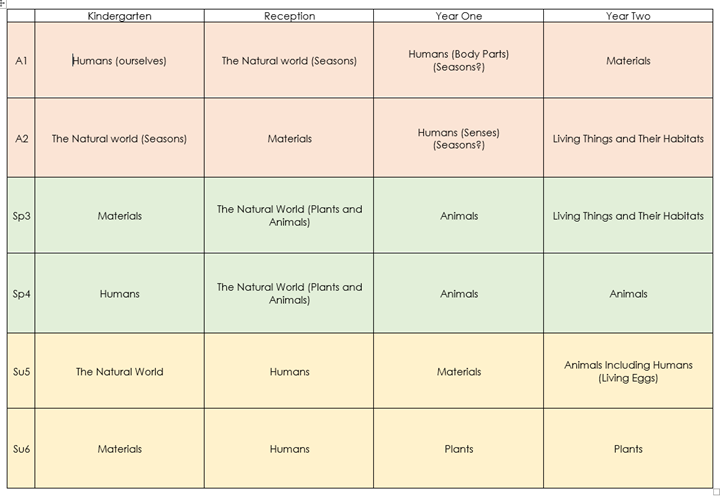Science at CKIS
Our vision for Science at CKIS
At Charlton Kings Infants’ School we acknowledge that Science is a core subject within the National Curriculum. We aim to inspire children by encouraging them to be inquisitive about their world. We believe Science should nurture our children’s innate curiosity and should enable them to develop scientific knowledge, skills and understanding, prompted by a desire to ask questions and find possible solutions. We believe that scientific enquiry should be at the heart of our Science Curriculum and that learning should take place through first-hand practical experiences. As an ECO school, we also believe that it is essential to ensure that our children respect our natural world and develop a firm understanding of the need to promote a sustainable future.

Purpose and aims of Science (Intent statement)
Our curriculum provides a broad range of experiences for our pupils: Our pupils’ backgrounds, our culture and our climate for learning provide the following drivers that underpin ALL areas of our Science curriculum:
- Learning to learn - which helps pupils to concentrate and focus and build resilience as learners
- Culture and Diversity - which helps pupils to develop enquiring minds about the wider world
- Environment and Community - which helps to instil in our pupils a respect for our environment and for our local and wider communities
– Creative arts and physical development - which helps our pupils to express themselves and excel as holistic learners
We offer a thoughtful range of experiences that support our culture: pupils enjoy a ‘full spectrum’ of academic, physical, spiritual, moral, social, cultural activities that enrich their lives. We aim to ensure that all children have the confidence and skills to develop as resilient life-long learners.

We aim for all pupils to:
- become fluent in the fundamentals of scientific knowledge and scientific enquiry (see year by year Curriculum Maps) so that they develop conceptual understanding and the ability to recall and apply these skills in their learning.
- acquire a wide scientific vocabulary and become confident enquirers. We aim to ensure that all children learn to ask increasingly probing questions and develop as confident communicators when explaining their own thinking and that of others.
- experience five types of scientific enquiry across the Science Curriculum.
- be introduced to a diverse range of scientist and people who work in science related jobs.
- encourage parental engagement of our science curriculum through our science open day and science week.

Our curriculum has been developed over time through:
- CPD provided by Initial participation in a Teacher Research Group developing responses to curriculum study.
- CPD by STEM to support the development of the five types of enquiry across the curriculum.
- Being part of research led training, development and support
- Networking with other schools and settings as well as participating in the Gloucestershire subject leader network meeting for science
The teaching of Science at CKIS (Implementation)

We use our SOW to inform our medium term plans to ensure progression and to take prior knowledge into account using lesson zero.
Units are planned across the year to ensure cross-curricular links and opportunities are available to incorporate seasonal change.
The Science curriculum is carefully and coherently sequenced to enable our children to develop a growing knowledge of the themes outlined above. Parents and new members of staff can access our “learning leaves” that give an overview of units of work.
Pupils’ knowledge builds towards clearly defined end points, so everyone knows what we expect our pupils to achieve by the end of each topic, each year and each key stage.
AT CKIS every child is recognised as a unique individual. We celebrate and welcome differences within our diverse school community, encouraging all to grow and flourish. Learning is centred around experiencing the joy of discovery.
The ability to learn is underpinned by the teaching of basic skills, knowledge, concepts and values, with a vision to prepare our children to be life-long learners, rooted in our school motto: The wings to fly…
Science in our Foundation Stage is covered in the ‘Understanding the World’ area of the EYFS Curriculum. It is introduced indirectly through activities that encourage every child to explore, problem solve, observe, predict, think, make decisions, and talk about the world around them.
During their first years at school our children will explore creatures, people, plants and objects in their natural environments. They will observe and manipulate objects and materials to identify differences and similarities. They will also learn to use their senses, feeling dough or listening to sounds in the environment, such as sirens or farm animals. They will make observations of animals and plants and explain why some things occur and talk about changes. Children will be encouraged to ask questions about why things happen and how things work. They might do activities such as increasing the incline of a slope to observe how fast a vehicle travels, or opening a mechanical toy to see how it works. Children will also be asked questions about what they think will happen to help them communicate, plan, investigate, record and evaluate findings.
KS1 pupils should develop fundamental scientific skills, become increasingly competent and confident and access a broad range of opportunities to extend their basic understanding of the world through scientific exploration. Teachers ensure that the children apply their knowledge, skills and understanding when undertaking investigations using the five types of enquiry.
- Research using secondary sources.
- Comparative and fair testing.
- Observing over time.
- Pattern seeking.
- Identifying, classifying and grouping.
Medium term plans include key vocabulary and links for texts related to the SOW for each unit of study.
Oracy forms an important part of our Science Curriculum. Children are taught subject specific vocabulary, which is modelled and reinforced by adults in the class rooms as well as being displayed. During taught sessions and independent challenge time, children are encouraged to use class sentence stems to engage in discussion, following our class discussion guidelines. Children take part in ‘Explorify’ sessions often as an introduction to a lesson to encourage discussion and use of oracy skills in Science.
Demonstrating learning
In Science pupils demonstrate their learning in the following ways:
The pupils demonstrate their understanding through enrichment tasks in the continuous provision. These are observed and could be recorded using Seesaw, examples of children's work in their special books and through cross curricular evidence.
Teachers carefully plan and monitor progress and adapt medium term plans to include key questions and checkpoints for children to demonstrate understanding in age-appropriate ways. For example,
- seesaw
- video
- cross-curricular
- science journals
- in play
Meeting the needs of all pupils (inclusion)
Our school supports the principle that young children learn through play, and through well planned structured opportunities that are relevant, engaging and promote deep level thinking and learning.
Teaching through both a rich continuous provision, paired work, small group and whole class learning opportunities skilfully builds upon the experiences of the child and promotes their next steps as a learner.
Teachers and Teaching Partners competently provide a balance of structured cross curricula learning activities and child-initiated opportunities through high quality indoor and outdoor learning environments.
In this way we aim to ensure that children are actively involved in their learning and deepen their knowledge, skills and understanding becoming masters of their learning as:
• Problem solvers
• Resilient learners
• Collaborative thinkers
• Inspired questioners
All pupils are entitled to a broad and balanced curriculum that meets their needs.
Science is taught in class groups, and accessible in our provision with all pupils included.
All our teachers know the pupils in their class and their differing needs well. They plan and adapt lessons to help all pupils know and remember more so they make very good progress.
Some pupils, including those with special educational needs or disabilities, or those with English an as additional language, may need extra support to access, understand and remember key concepts.
For these pupils, teachers use a range of effective strategies, whilst promoting independent learning as far as possible. These may include:
● adapting and scaffolding pupil activities and resources
● focussed additional support from an adult in class
Word banks for key vocabulary accessed on Widgit to ensure access for all pupils
● extra pre learning or overlearning of key knowledge before or after the lesson
- A wheel chair accessible work bench for science
- Enabling pupils to present their learning through their own creativity including video recordings and artwork.
Some pupils very quickly grasp the main concepts being taught and are able to think more deeply to extend their learning. To ensure they reach their full potential, teachers may:
● set more complex activities that require thinking at greater depth
Use of Explorify to initiate deeper thinking for all children
● ask pupils to apply their knowledge to a different situation
● go further by asking them to explain their thinking to others or present their findings to a group
Assessment (Impact)
Formative Assessment
At CKIS teachers will assess the children’s prior knowledge at the start of a unit by revisiting previous learning with a “lesson zero.” They will constantly assess how far their pupils understand key concepts throughout lessons, mainly through questioning and observation. Quizzes and other games are regularly used to assess how far pupils have remembered learning from the lessons before. Teachers then adapt their teaching to ensure misconceptions or gaps in knowledge are addressed. In addition, they may need to introduce opportunities for more challenge or deeper thinking.
End of unit Assessment
Key assessment criteria are written into our school curriculum and medium-term plans.
Assessments of children's learning are made and assessed through observations and classwork and shared as evidence on SeeSaw. These assessments contribute to a summative judgement at the end of each term against the science statements supplied by the science lead and found on INSIGHT.
Teachers and subject leads monitor children’s progress and attainment throughout the year to inform ongoing teaching and learning.
The science lead will undertake book looks, monitor INSIGHT, talk with children and monitor the balance of disciplinary/substantive knowledge that has been taught.
Teachers may inform parents during parents evening consultations about their child’s progress in science. They will also have access to seesaw where areas of the science curriculum will be shared. In the EYFS parents will be informed of their child’s attainment within Understanding of the year
Summative data is submitted for Year 2 as required nationally using the ‘Exemplification of Standards in Science’ to inform our judgements. This will cease be a statutory requirement as of July 2023.
Monitoring and Evaluation
The subject leader for Science monitors the quality of education regularly in accordance with the school’s monitoring timetable. This may take the form of:
● learning walks and drop ins, usually with a member of the senior leadership team, and sometimes with a governor.
● book looks. The subject leader looks at a range of books or other evidence across the school, sometimes with senior leaders or an adviser or governor.
● scrutiny of planning, particularly to evaluate coverage and progression within the curriculum as well as the extent to which planning is catering for the range of needs of pupils
● pupil conferencing
● surveys for pupils and/ or staff
● lesson observations
Subject leaders have regular support from the senior leadership team where aspects of the subject policy and action plan are monitored and discussed. Action plans are reviewed and shared with the staff three times a year to ensure all staff are aware of key actions.
Resulting actions may emerge with additional leadership support, resources or policy changes implemented.
Subject leaders routinely have a teacher appraisal objective linked to an aspect of their subject leadership. Following all these activities, strengths and areas for development are reported and discussed with staff. Resulting actions are recorded on the subject action plan and reported to governors.
At the end of each year the action plan for Science is fully evaluated. In addition, the subject leader evaluates how far Science is meeting our curriculum intent statement. This evaluation feeds into the action plan for the following year. Evaluated action plans and evaluations are reported to the senior leadership team and governors.
The role of the governors
Every subject has a specific governor allocated to it. The governor for Science is Rob Austin - Goodall.
This governor evaluates the activities within this aspect and the impact on the quality of education and pupil outcomes.
They meet with subject leaders and review aspects of the subject, including seeing lessons in practice and talking to children.
Their findings are reported to the Governing Board. In this way, leaders are held accountable for the aspects they are responsible for, and subject leaders are able to access the appropriate support and resources to achieve their aims.
